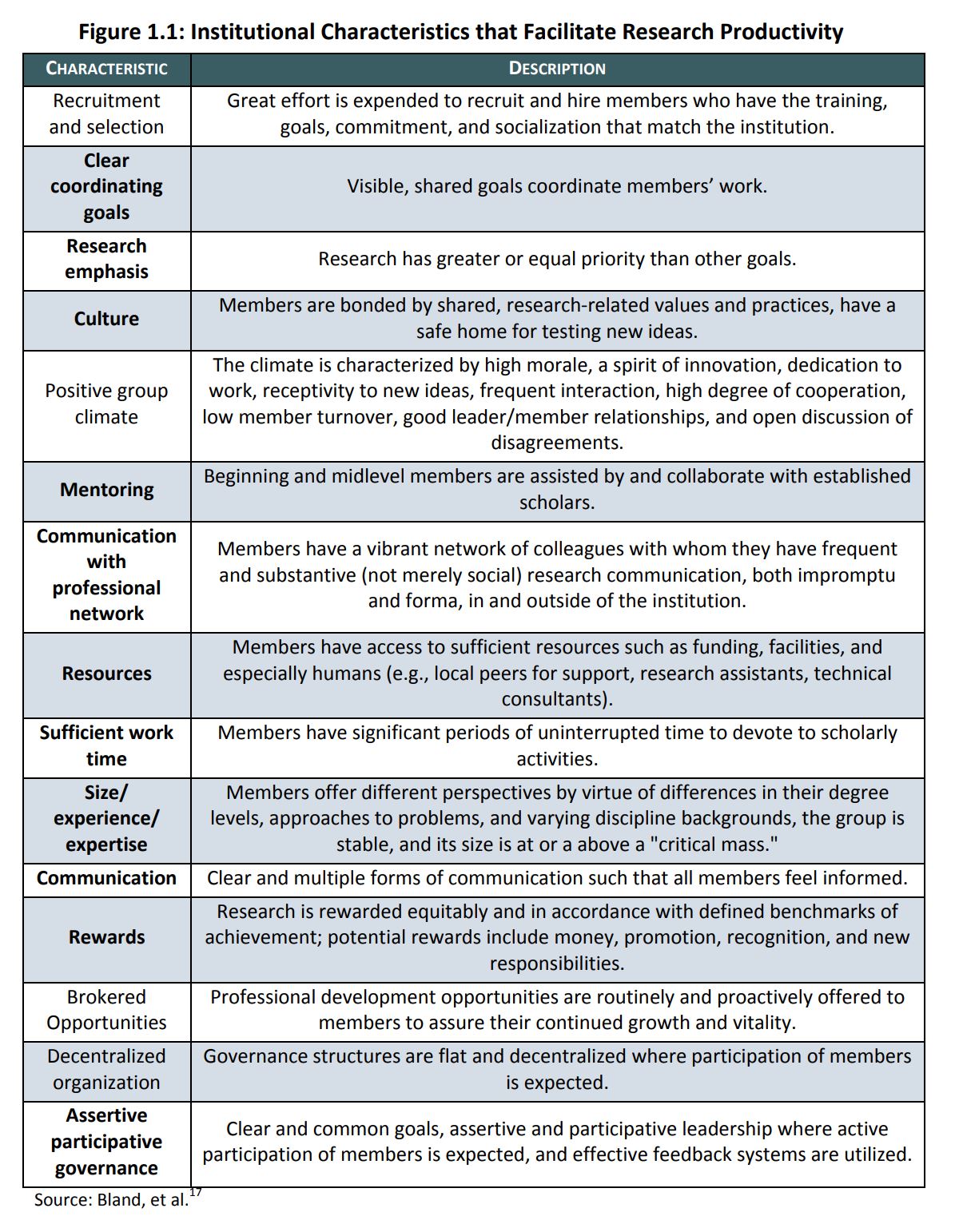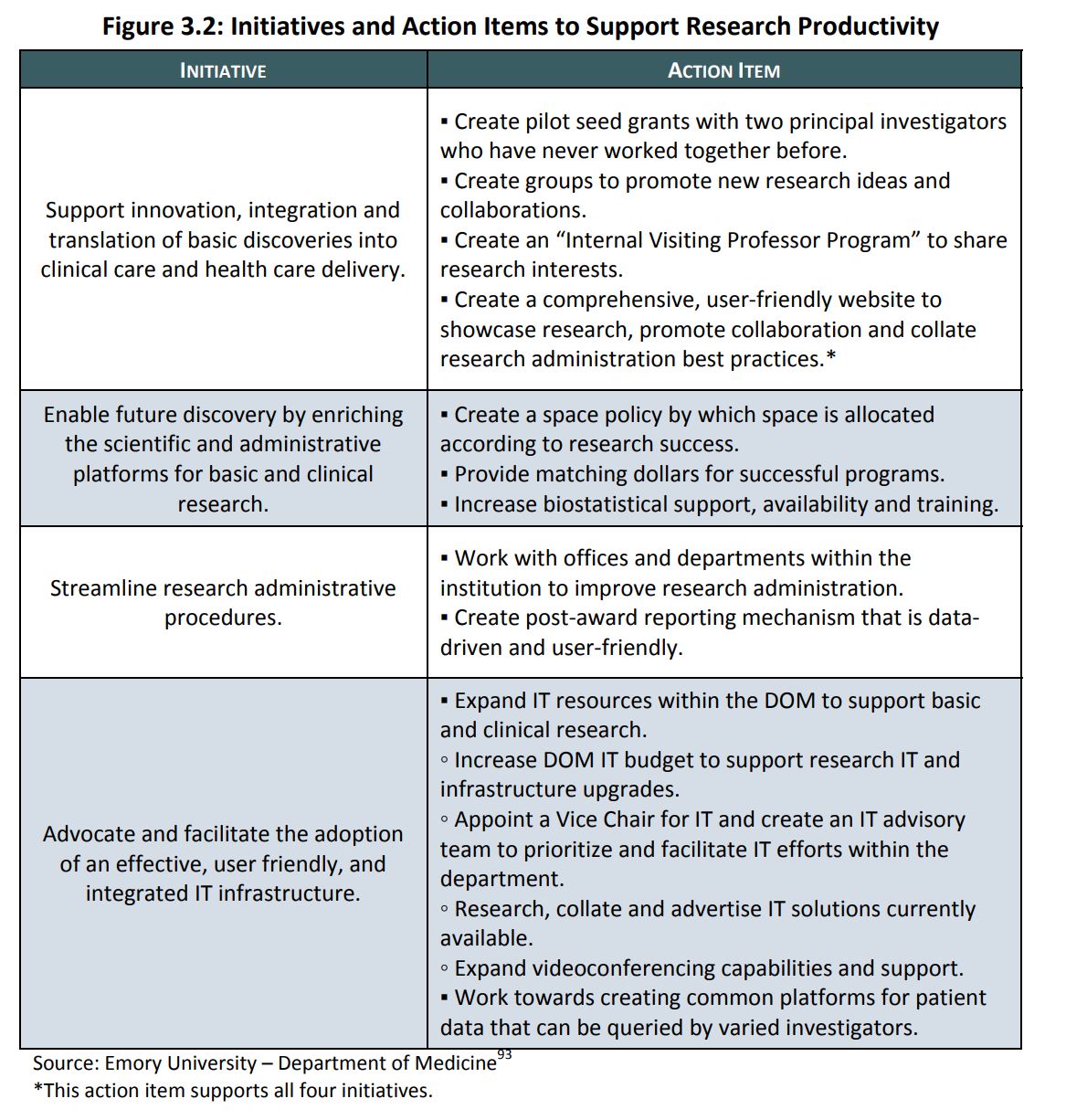Teaching and Research
Teaching and research are typically the core responsibilities for faculty. Milhans and Duvall (2018) shared the 10 Things I Wish I Knew When I Started My Career that are worth consideration for all faculty.
- Network
- Professional connections on campus, nationally and internationally can be valuable resources and collaborators
- Follow your personal vision
- Be open to change
- Ask for help
- Find a mentor or two
- Listen for leadership
- ...expressing good, well-thought-out ideas gains more respect
- Trust your instincts
- Only you have the wisdom to decide the best route for you
- Hire your boss
- Who you work for and report to matters so much to your overall productivity, contributions, growth, success, and happiness
- Cultivate relationships
- If you want to be the most effective change agent and leader, you must care about the people you are working with
- Perception is reality
- In every interaction you're establishing your "brand," so be intentional about it!
- Embrace fear
- Reach out to a peer or leader about a mentorship, speak up about a different approach or idea in meetings, push yourself to write an article or present at a conference…continually expand your comfort zone
- Lead from where you are
- Leaders are passionate, influential, and actively listen to those around them
Teaching
Developing a Course
Creating an effective course is one of the most important responsibilities of a faculty member. Begin as early as possible. As with your area of expertise, course design and teaching are skills and professions that take years to develop, so ensure you take advantage of the resources and services available at the Teaching and Learning Center.
Course Pre-Planning
- Where and how does the course 'fit' into the overall program curriculum?
- What are the essential skills and capabilities the students need before entering the course (pre-requisites)?
- What are the essential skills and capabilities (goals and threshold concepts) the students should have whne successfully completing the course?
- Who are my students?
- Ask your colleagues and teachers for the previous semester/year
- Where am I teaching? Where can I teach?
- Explore learning environment options to 'best fit' your students and course needs
- Are there practical experiences? Simulations (CHIPS)?
- What available technologies may be needed?
- Academic Technologies (TLC)
- Anatomage Table (Library)
- What course design 'best fits' the students needs?
- In general, the more student-centered the course design, the greater likelihood that significant learning will occur
- What course materials, library resources and reserves, and other course-related resources and services do I need to reserve?
- What are the departmental, college and institutional requirements for the course?
Course Development
Course design is a critical starting point for facilitating and maximizing student learning. Effective course design provides numerous benefits to both the teacher and learner. Course design is a deliberate, systematic and creative endeavor for the teacher to best enable the students to attain the threshold concepts (goals) of the course. Based on your pre-planning (especially your course goals), determine the framework for which you will design your course. Course design overview.
- Course design models
- Case and Problem-Based Learning
- Experiential Learning
- The Flipped Classroom
- Integrated Course Design - University of Washington, Bothell
- Module
- Team-Based Learning
- Universal Design for Learning and Instruction
Assessment
- How will I determine to what degree the students have attained the course goals?
- What assessment activities will I use?
- E.g. demonstrations, matching or ranking activities, portfolios, assignments, performances, problems/challenges, etc.
- What assessment tools will be the most appropriate for the activities?
- E.g. checklists, rating scales, rubrics, quizzes, exams, etc.
- How will these assessment outcomes be translated into grades?
- What assessment activities will I use?
- Effective Assessment
- Meaningful Grading
Meaningful Learning Experiences
Meaning learning experiences should promote progress toward the course goals and provide opportunities for the students to explore the key concepts, skills and ideas of the course. Priority should be given to learning experiences which are
- Active
- Authentic
- Challenging (require thought, see Really Learning)
- "Colleges and universities do demand the creation of new knowledge. But that's not typically the task assigned to most students; for them, education consists of learning about existing knowledge, committing collective memory to personal memory," (Watters, October 23, 2017, EDUCAUSE)
- Universally designed
- Scafolded
- Opportunities for student choice
- Team-oriented
- Communication, negotiation and collaboration
- Engaging
Through course design and and course schedule, and the development of the learning experiences the students should be provided with guidance on expectations for before, during and after class cycle.
- Before class activities focus on creative or preparatory experiences which will beutilized during class
- During class experiences should emphasize skills, capabilties and activities which cannot be experienced
in the same way elsewhere
- E.g. group work, analyses, experiments, problem solving, peer sharing, negotiations, etc.
- After class activities focus on debriefing and reviewing the in-class experiences, connecting learning to previous learning experiences and working with collaborators on projects, problems and other learning tasks
Scholarship of Teaching and Learning
The purpose of scholarly teaching is to affect the activity of teaching and the resulting learning, while the scholarship of teaching results in a formal, peer-reviewed communication in appropriate media or venues, which then becomes part of the knowledge base of teaching and learning in higher education (Richlin & Cox, 2004, p.127).
- Scholarly teaching utilizes the professional literature, course learning data, peer evaluations and other pertinent informational sources to guide their course design and teaching and learning activities. This is primarily a private and self-reflective process.
- The scholarship of teaching and learning (SoTL) focuses on student learning and course design and teaching approaches to best support the learning. It includes scholarly research and sharing of what is learned via professional presentations and publications. This is a public process, open to critical review and incorporates pedagogical innovations, theory and knowledge.
- Getting Started - Vanderbilt University
- Research Ready SoTL - Grand Canyon University
- Includes an 8 step module
Web Resources
- International Journal Scholarship of Teaching and Learning (open access)
- Journal of the Scholarship of Teaching and Learning - Indiana University
- Keeping Up With… The Scholarship of Teaching and Learning - Association of College & Research Libraries
- Practicing the Scholarship of Teaching and Learning - University of Washington
- Scholarship of Teaching and Learning - DePaul University
- Scholarship of Teaching and Learning - Georgetown University
- What is the Scholarship of Teaching and Learning? - Stanford Teaching Commons
Research
"A culture of research provides a supportive context in which research is uniformly expected, discussed, produced, and valued," (Hanover Research, 2014, p. 4). Research is critical for university, department and program reputation and faculty advancement. Arnaudova (2014) suggests 10 tips for developing a programmatic line of research. The first three are key:
- Start with a specific project/focus
- Have a strong paradigm
- Work with your supervisor/mentor


UTHSC Resources
Resources
- Arnaudova, I. (2014). Ten tips for developing a programmatic line of research. Association for Psychological Science
- Bland, C., Center, B., Finstad, D. Risbey, K. & Staples, J. (2005). A theoretical, practical, predictive model of faculty & department research productivity. Academic Medicine, 80(3), 225‐237
- Cronan, M. & Deckard, L. (October, 2016).New faculty guide to competing for research funding. (2nd ed.). Academic Research Funding Strategies, LLC
- Hanover Research. (May, 2014). Building a culture of research: Recommended practices. Hanover Research, Academy Administration Practice
- Markin, K. (August 14, 2013). How to help new hires get research money. The Chronicle of Higher Education
- Martin, L. (Spring, 2007). Defining the Scholarship of Teaching versus Scholarly Teaching. Teaching & Learning in Higher Education, 46, 1-3
- Milhans, J. & Duvall, K. (February 26, 2018). 10 things I wish I knew when I started my career. The Professional Development Commons, EDUCAUSE Review
- Research Tools & Tips - Emory University
- Richlin, L., & Cox., M. (2004). Developing scholarly teaching and the scholarship
of teaching through faculty learning communities. New Directions for Teaching
and Learning, 97, 127-135
